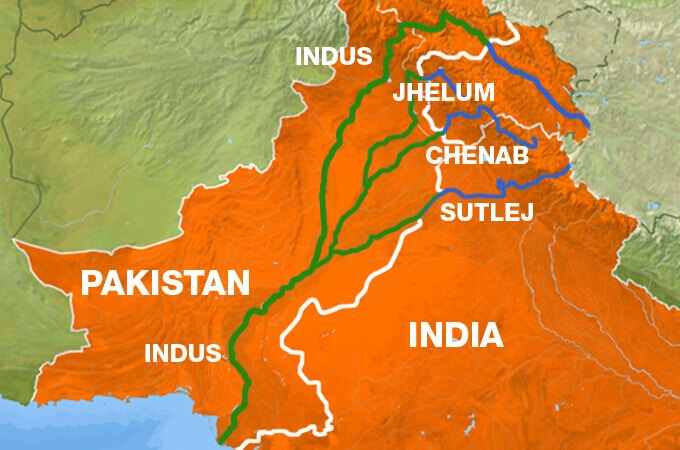Pakistan has accused India of engaging in fifth-generation warfare after India released 24,000 cusecs of water into River Sutlej, according to sources at the Indus Water Commission.
China, Pakistan Vow To Protect CPEC Projects, Gwadar Port Amid Regional Flare-Up
According to sources, the data which was received by Pakistan at 7pm on Monday revealed; India has released 24,000 cusecs of water into River Sutlej. Sources further said the flow of water released in the Harike and Ferozpur Barrage is 150,000 cusecs while nearly 200,000 cusecs of water can be released into the Sutlej River.

India has released up to 0.2 million cusecs of water into the River Sutlej without notifying the relevant authorities. A spokesperson for National Disaster Management Authority (NDMA) Brigadier Mukhtar Ahmed said a flood relay coming from Indian Punjab in the Sutlej River can enter Pakistan at any time this afternoon.
Indus Water Treaty Needs To Be Renegotiated With India: Pakistan Kashmir PM
He added, at present, the water level at Ganda Singh Wala village in Kasur District is around sixteen to seventeen feet and 24,000 cusecs of water is entering at Ganda Singh Wala currently.
Earlier, Pakistan Commissioner for Indus Waters Shiraz Jamil Memon said India had suspended the Indus Waters Treaty and stopped all kinds of data sharing related to the water agreement between the two countries. India also did not notify Pakistan about releasing additional water into River Sutlej, the official said.
Indus Water Treaty
The Indus Water Treaty is a World Bank-brokered settlement signed in Karachi on September 19, 1960, between Pakistan and India to use the water available in the six rivers of the Indus system.
As per this agreement, India was given control over the water flowing in three eastern rivers – the Beas, the Ravi and the Sutlej with the mean flow of 33 million acre-feet (MAF), while Pakistan was given control over the water flowing in three western rivers – the Indus, the Chenab and the Jhelum with the mean flow of 80 MAF.
Dispute Over Indus Water Treaty?
Even though India and Pakistan have been sharing the waters without major dispute, experts talking to EurAsian Times state that the agreement is not fairly negotiated as India is only allowed to use only 20% of the six-river Indus water system.
Pakistan recently sought an international arbitration if India sought to build hydropower projects on the Jhelum and Chenab rivers. Though the agreement has been seen as one of the most successful water-sharing pacts, the current tension between the two South Asian neighbours might well lead to a flashpoint. Experts say that future wars could well be fought over water.
Can India Revoke The Indus Water Treaty?
The Indus Water Treaty has survived three wars between the two countries. Although India has often raised the issue, saying that for a treaty to work there had to be “mutual cooperation and trust” between the two sides, this seems to be more pressure tactics than any real threat to review the bilateral agreement.
Pakistan Accuses India Of ‘Water Terrorism’ After Delhi Releases Excess Water Into Pakistan’s Punjab
And the idea that India can frighten Pakistan by threatening to cut off river waters or release excess water during monsoon season is nothing new. A unilateral abrogation of the treaty could attract global criticism and New Delhi would only use the rivers as pressure tactics and threaten Pakistan.
However, after the revocation of Article 370 from Jammu and Kashmir, the only thing that can be stated for the Indus Water Treaty is ‘Modi Hain Toh Mumkin Hain’ (Everything is possible under PM Modi.




